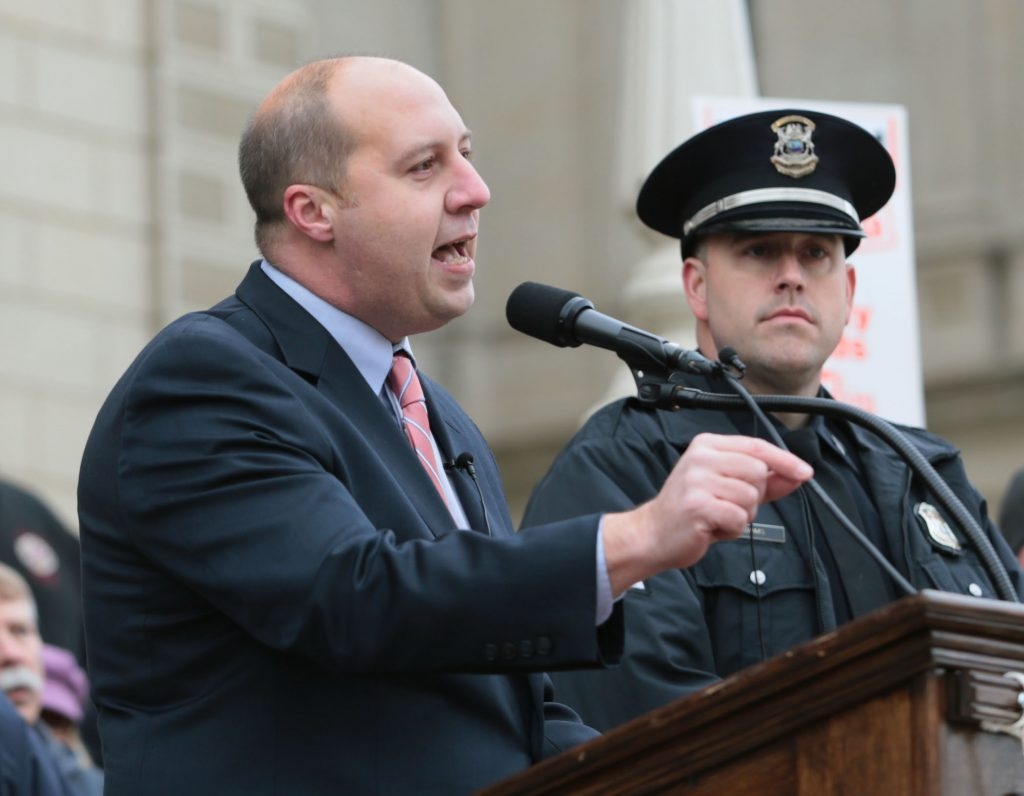State Sen. Curtis Hertel Jr., D-East Lansing, last week reintroduced legislation he hopes will address the sexual assault crisis on college campuses by better educating grade-school students about consent.
SB 270, introduced on April 17, would require covering “affirmative consent” in the state’s sex education curriculum and schools having a more robust conversation about sexual assault, dating violence and bystander intervention, Hertel said.
Specifically, the legislation requires consent instruction to cover eight criteria, such as how a lack of physical or verbal resistance based on a threat does not constitute consent, nor does “an individual’s manner of dress” constitute consent. Other key instruction requirements are that consent can be rescinded at any point, and a dating relationship doesn’t imply consent.
Teaching consent is the “biggest thing missing” from sex education in Michigan, Hertel told Revue.
“We have a huge epidemic of sexual assault going on at college campuses. It also happens in our high schools and among people who don’t go to college,” he said.
The bill comes a week after a Michigan State University student spoke publicly for the first time about being sexually assaulted by three MSU basketball players. Student Bailey Kowalski sued MSU last year and accuses the university of encouraging her to not report the rape four years ago.
Hertel added that college-level officials often say students aren’t prepared well enough in grade school to address the sexual assault problem.
“If we can change the culture beforehand and instill one that I think is basic human respect to other peoples’ bodies, I think it would go a long way in stemming the tide,” he said.
Based on a scaled-back version of Hertel’s bill last session, the budget last year included funding for the state to update its Michigan Model curriculum to include affirmative consent, if districts adopt the program. Hertel said some schools in his district have done so.
Broadly, though, schools aren’t talking about affirmative consent, Hertel said. Various sex ed curriculum used in schools — which vary and at times promote abstinence-only education — “aren’t dealing with the real-world situations our college students find themselves,” Hertel said, and contribute to a culture that tolerates sexual assault.
West Michigan in particular has been a battleground over sex ed curriculum used in schools. The West Central Michigan chapter of the Young Women’s Christian Association (YWCA) is one organization hoping to discuss issues around gender roles and stereotypes with middle schoolers in an effort to address the cultural aspects of sexual assault. The LGBTQ youth community also has been negatively impacted by traditional sex ed programming that doesn’t recognize their identity.
Hertel says his bill focuses solely on affirmative consent and doesn’t delve into other issues around sex ed curriculum.
“There’s lots of changes I’d probably like to see to sex ed,” he said. “At the same time, this is a reasonable, passable bill both parties can agree with. I don’t want to deal with five different conversations at once.”
Some of the public response so far, though, has been anything but reasonable. While Hertel says it’s “mostly supportive,” some commenters on social media and newspaper websites have confirmed his concerns.
| A comment from an article on MLive regarding the bill. |
“Someone was literally describing and justifying rape in comments on an MLive article,” he said, referring to a comment suggesting it would be “impossible” for a woman to not give her consent. “That should give us all pause. It perfectly proves why these bills are important. The fact that people are so brazenly saying these things publicly really does show we have to change our culture.”
Hertel said SB 270 has “small technical changes” from bills introduced in past sessions.
Gov. Gretchen Whitmer, a sexual assault survivor, also announced her support for the bill. During her time in the Senate, Whitmer was a vocal opponent of far-right abortion bills proposed by the Republican Legislature.
“I’m proud to support Senator Hertel’s bill because we need to get to work lowering the number of sexual assaults in Michigan, and that starts with teaching our kids about consent,” Whitmer said in a statement. “Right now, we’re not doing everything we can to spread awareness about affirmative consent, and as a result, 1 in 5 women and 1 in 16 men are victims of sexual assault while they are college students in Michigan. Our students deserve better. By passing this bill, we can send a message to Michiganders that sexual assault will not be tolerated in our state.”





